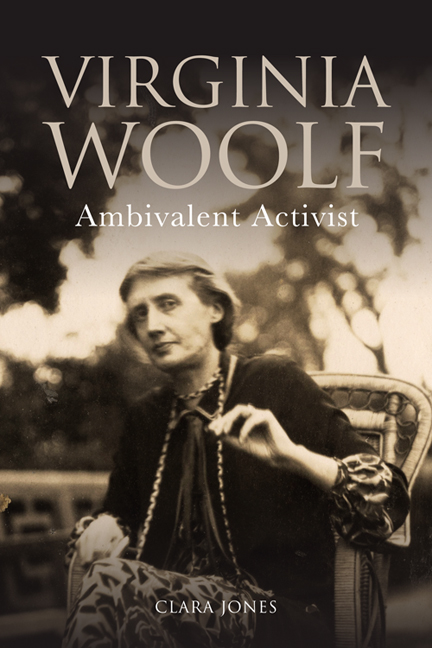Book contents
- Frontmatter
- Contents
- Acknowledgements
- Abbreviations
- Introduction
- 1 Virginia Stephen and Morley College, 1905–7
- 2 Virginia Stephen and the People's Suffrage Federation, 1910
- 3 Virginia Woolf and the Women's Co-operative Guild, 1913–31
- 4 Virginia Woolf and the Rodmell Women's Institute, 1940–1
- Conclusion
- Appendix 1 The ‘Morley Sketch’
- Appendix 2 The ‘Cook Sketch’
- Bibliography
- Index
2 - Virginia Stephen and the People's Suffrage Federation, 1910
Published online by Cambridge University Press: 05 September 2016
- Frontmatter
- Contents
- Acknowledgements
- Abbreviations
- Introduction
- 1 Virginia Stephen and Morley College, 1905–7
- 2 Virginia Stephen and the People's Suffrage Federation, 1910
- 3 Virginia Woolf and the Women's Co-operative Guild, 1913–31
- 4 Virginia Woolf and the Rodmell Women's Institute, 1940–1
- Conclusion
- Appendix 1 The ‘Morley Sketch’
- Appendix 2 The ‘Cook Sketch’
- Bibliography
- Index
Summary
Introduction
By the way, are you an Adult Suffragist? This is a real question. (L1 426)
Unlike the voluminous correspondence with Margaret Llewelyn Davies and the self-critical diary entries that illuminate Virginia Woolf's enduring relationship with the Women's Co-operative Guild, we have only scattered references to her voluntary work for the suffrage and to the movement in general from January to November 1910. Although they may appear to speak only of Virginia Stephen's initial enthusiasm rapidly transformed into impatient criticism, these seemingly throwaway references have the potential to alter our understanding of Virginia Stephen's encounter with suffragism and contribute usefully to the wider narrative of the suffrage campaign at a pivotal moment in this battle.
This chapter's opening quotation is a significant example of this dual historical potency. The last line of a typically playful letter to her close friend and fellow reviewer Lady Eleanor Cecil, this provocative question is consistent with Virginia Stephen's affectionate but challenging style. Its startling appearance at the conclusion of a letter otherwise concerned with personal matters, and the striking contrast between the urgency of Stephen's statement – ‘This is a real question’ – and the teasing and in-jokes that precede it, suggest more might be at stake in this curious correspondence than first appears.
The daughter of the Earl of Durham and the wife of Lord Robert Cecil, the Conservative MP, Nelly Cecil, as Virginia Stephen affectionately addressed her, was from the aristocracy proper and an important friend to Virginia Stephen when she was in her early twenties. During her period at Morley College, Virginia Stephen's letters to Nelly Cecil show her at her most snobbishly detached – when describing the adverse effects of teaching composition to a ‘Milkman’ (L1 281) – but also her most committed; she appealed to Nelly Cecil on behalf of one of her students, Cyril Zeldwyn, an enthusiastic socialist in need of employment (L1 321). This second example demonstrates Virginia Stephen's willingness to reveal her social commitment to Nelly Cecil and also her awareness of the powers and privileges that accompanied her friend's aristocratic status. Nigel Nicolson suggests that Virginia Stephen's letters to her friend recognise Nelly Cecil's high-class position but also gently mock this grandness: ‘behind Virginia's letters is the suggestion that Nelly is nicer than all this implies’ (L 1 xix).
- Type
- Chapter
- Information
- Virginia WoolfAmbivalent Activist, pp. 65 - 107Publisher: Edinburgh University PressPrint publication year: 2015



